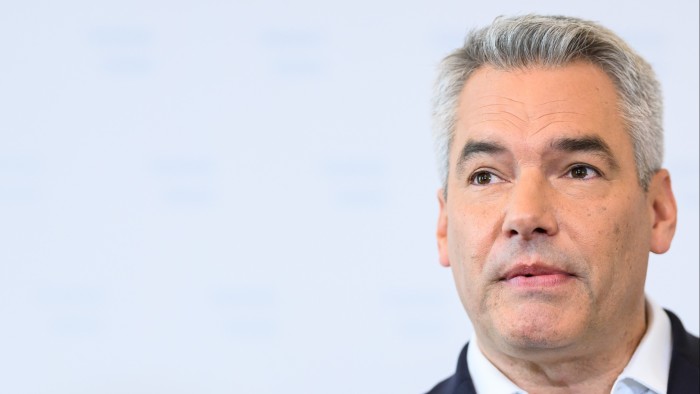Unlock the Editor’s Digest for free
Roula Khalaf, Editor of the FT, selects her favourite stories in this weekly newsletter.
Austrian chancellor Karl Nehammer has announced his resignation after the collapse of months-long efforts to forge a centrist coalition that excluded the far-right.
The country faces the possibility of fresh elections after the failure to form a government without the anti-immigration, pro-Russian Freedom Party (FPÖ), which secured a historic first place finish in a nationwide vote in September.
Nehammer, who also announced he would stand down as leader of the moderate conservative People’s party (ÖVP), had been tasked by the country’s president with seeking to form a coalition after all the other parties in parliament ruled out working with the FPÖ’s hardline leader Herbert Kickl.
The 52-year-old, who has served as chancellor since 2021 when his predecessor Sebastian Kurz stood down amid a corruption investigation, had sought to strike a deal with the Social Democrats and the small, liberal Neos party.
But on Friday Neos abruptly pulled out of the talks and on Saturday Nehammer announced that he was abandoning efforts to form a government.
“Unfortunately I have to tell you today that the negotiations have ended and will not be continued by the People’s Party,” he said in a video statement on the social media platform X.
“I will stand down as chancellor and as leader of the People’s Party in the coming days and enable an orderly transition.”
Nehammer said that “destructive forces” in the Social Democratic Party had “gained the upper hand” in negotiations and that his party was not willing to sign up to its proposed economic programme.
Social Democratic leader Andreas Babler said he regretted the ÖVP’s decision to end the talks, adding that his party had been willing to make compromises. “This is not a good decision for our country,” he said.
The failure of the negotiations deepens Austria’s political uncertainty at a time when its economy is at risk of shrinking for a third year running in 2025. The country is also facing the challenge of finding between €18bn and €24bn in budget cuts, according to figures from the EU Commission.
One possibility is fresh elections, but that could risk further bolstering the Freedom Party, with polls suggesting that the far-right party has gained in support since the vote in September, when it won 29 per cent.
The ÖVP must also begin the search for a new leader, with officials expected to meet on Sunday to discuss the process.
Austrian political analysts were already speculating on Saturday that Kurz may seek to regain leadership of the ÖVP, after the former chancellor’s biographer hinted in an article published in German newspaper Bild that people close to him were weighing the chances of a political comeback.
While Nehammer had always ruled out working with far-right leader Kickl, who has taken the Freedom Party even further to the right since taking the helm in 2021, Babler warned of the danger that his successor as leader of the conservative party could be willing to strike a deal with him.
“We know what threatens to happen now. An FPÖ-ÖVP government with a right-wing extremist chancellor that will endanger our democracy on many points,” he said.
Additional reporting by Sam Jones
Read the full article here





